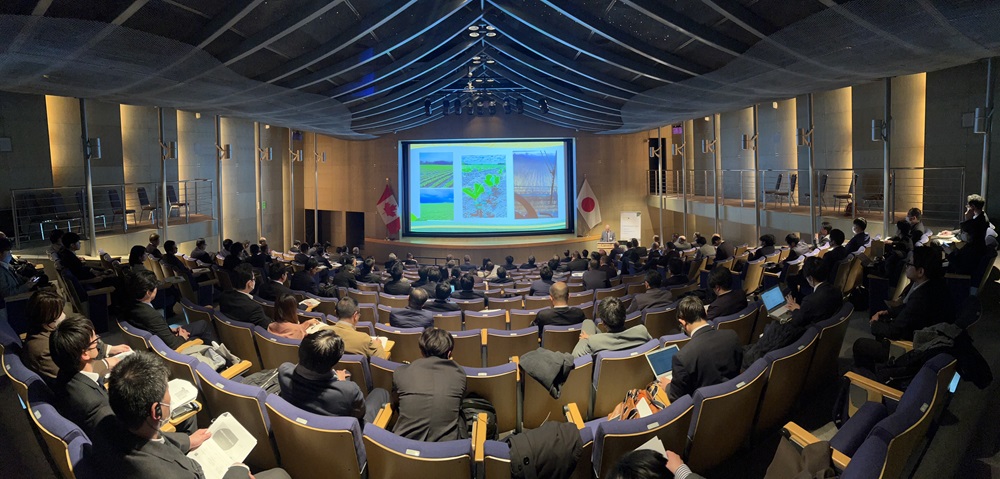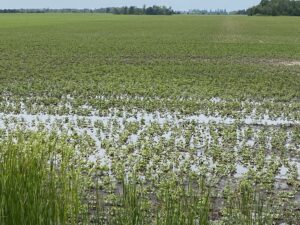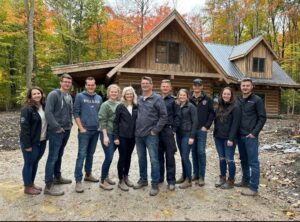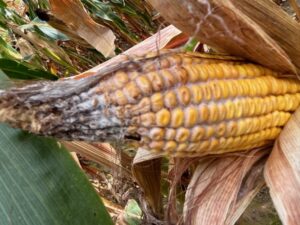Sustainable Canadian Soy program
OPENING DOORS TO INTERNATIONAL RECOGNITION

“ONTARIO FARMERS HAVE BEEN PRIORITIZING SUSTAINABILITY FOR GENERATIONS; it’s second nature to follow practices that protect and preserve our land and farms,” says Margaret Vincent, who farms in Wingham, Ontario, raising livestock and growing corn, wheat, soybeans, and alfalfa.
The commitment farmers have to sustainable farming practices has made the introduction of the Canadian Sustainable Soy program a success with customers and participating farmers.
Announced in March 2023, the Sustainable Canadian Soy program is Canada’s commitment to producing and providing verified sustainable soybeans and is voluntary for Canadian soybean growers, grain handlers and exporters.
INDUSTRY-DEVELOPED AND MARKET-DRIVEN
Industry-developed and market-driven Soy Canada developed the program with extensive farmer and industry consultation, and is now in its second year. Based on the Sustainable Agriculture Initiative Platform’s Farm Sustainability Assessment (FSA), a globally recognized and widely accepted program for sustainable sourcing — a whole farm sustainability assessment incorporating economic and financial viability, social responsibility, and environmental protection.
The Canadian Sustainable Soy program provides globally recognized verification of sustainable production practices that can be measured against fellow farmers across 126 crops in more than 40 countries worldwide through the FSA.
Scott Persall, Grain Farmers of Ontario director for District 5 (Elgin, Norfolk) and board member of Soy Canada, recently returned from a market development trade mission to Thailand and Japan and reports that the Japanese market, a significant importer of Canadian soybeans, is very interested in the program and potential to purchase verified IP soybeans from Canada. “As a farmer, I’m proud to hear that they value the high-quality food-grade soybeans customers purchase from Canada, and the Sustainable Canadian Soy program shows these markets that not only do we produce high-quality products, but we grow them sustainably, and we can enable suppliers and buyers of Canadian soybeans to make sustainability claims with confidence,” says Persall.
Brian Innes, Soy Canada executive director, explains that customers of Canadian value- added soybeans have been asking for a verifiable sustainability program, and this program will help Canada’s soybean value chain compete for market share in North American and global markets.
“Many of us already use sustainable practices that are part of the program,” points out Persall, who also participated in the working group that developed the program. “This program just verifies what we follow on our farms and will allow the Canadian soybean industry to maintain and potentially gain more access to markets seeking the verification.”
ON-FARM PARTICIPATION
Vincent has been invested in building an on-farm sustainability verification system for years. Working with her local exporter, Snobelen Farms, she was involved in piloting the FSA program and was one of the first growers to complete the required on-farm sustainability questionnaire. The questions covered her cropping and general farming practices, including nutrient management, health and safety, social commitments and responsibilities, and the general viability of the farm business practices. She says she was first attracted to the program as an opportunity to demonstrate that her family farm was already following best management practices, just like most farms across Canada.
Since filling out her first FSA questionnaire six years ago as an IP soybean grower, Vincent has reviewed it a few more times, updating the information as her farm changes. She isn’t currently growing IP soybeans but realizes the benefits of participating in the program and the opportunities it provides to easily identify and understand the progressive practices she implements. “Maintaining our sustainability verification also strengthens our relationships with our industry partners, and I look forward to growing our business with it,” she notes.
Program participants are subject to third-party verification audits to ensure growers are implementing the practices they attest to in the FSA. Vincent was randomly selected to participate in an audit two years ago, a process she describes as very smooth. “The audit involved showing our completed paperwork and our farm facilities,” she reports.
Eric Donnan of Donnandale Farms in Stirling, Ontario, is also enrolled in the Canadian Sustainable Soy program, growing IP soybeans for Ceresco, an exporting company that sells most of Donnan’s IP soybeans to customers in Japan. He believes sustainability is doing due diligence as farmers to take care of the land to the best of their ability and use the tools around us to ensure a profitable business.
Donnan says Ceresco approached him to participate in the program last year. The exporting company was looking to expand to offer buyers the sustainability claim they were asking for. He says the additional work to participate in the verification program is minimal. “If you’re already growing IP soybeans, you’re likely already doing most of the work required to be part of the sustainability program.”
PROVING PRODUCTION PRACTICES
Three Canadian export companies are participating in the sustainable verification program, with farmers enrolled in the program through these exporters. “If you want to participate in the program and are currently growing IP soybeans, talk to the company you are growing for to see if they have a market for sustainable soy,” says Persall. He also recommends that farmers interested in but not growing IP soybeans consider looking into IP soybeans to see if they are a fit for their farm. “The recent Indo-Pacific trade mission showed me that there is a big demand for IP soybeans in the world, and Canada has an opportunity to increase our portion of the food-grade market. The Sustainable Canadian Soy verification program can help us get there.”
Vincent believes verification programs are a valuable opportunity for the agricultural industry, providing opportunities to work together and demonstrate the production practices Canadian farmers are proud of. “It’s important the rest of the world knows the progressive practices and standards we follow on the backroads of Ontario and what it takes to deliver the highest quality soybeans.”



























